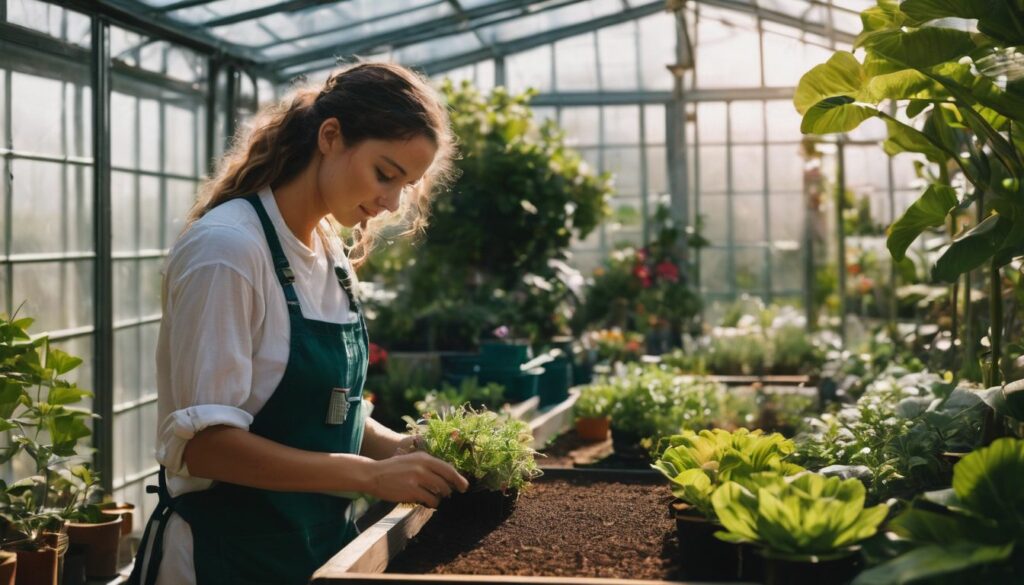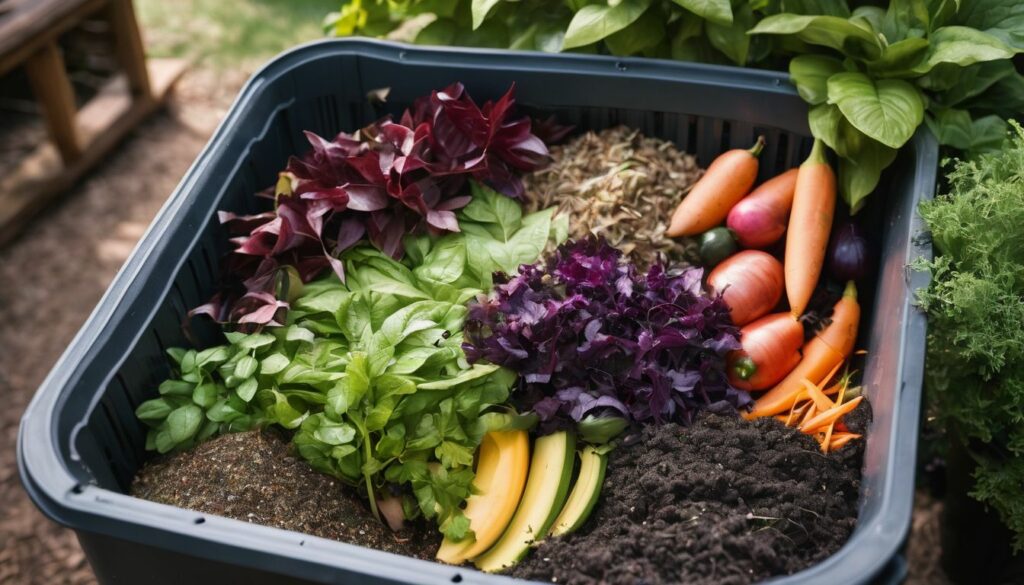Growing your own vegetables can be a labor of love that brings immense satisfaction and fresh salads to the dinner table. But, oh boy! Tackling those pesky garden pests? Now that’s not quite the joy ride.
I’ve had my fair share of rounds with slugs, snails, beetles – you name it. These villains have haunted many green thumbs like us. After years of rolling up my sleeves in research and trial-and-error combat, I’ve uncovered effective tactics for warding off these uninvited guests from our precious greens.
A key to winning this battle is attracting helpful insects that naturally reduce pest populations – isn’t nature beautifully balanced? Let’s unearth these organic solutions together because every green thumb should enjoy a serene oasis free from nuisances!
Key Takeaways
- Know which insects are beneficial and harmful to your garden for effective pest management.
- Encourage healthy soil by adding organic matter like compost or mulch, testing soil pH, and using natural repellents like strong-scented herbs.
- Plant resistant varieties of vegetables, use physical barriers like insect mesh, and attract beneficial insects with flowering herbs and flowers.
- Practice crop rotation and interplanting to confuse pests and reduce their populations naturally. Regularly monitor for common pests like aphids, caterpillars, flea beetles, Japanese beetles, mealybugs, scale insects, slugs, and snails. Take appropriate measures such as handpicking or using organic controls when necessary.
Identifying Good and Bad Insects
Knowing which insects are beneficial and harmful to your garden is crucial for effective pest management.
The importance of knowing which insects are beneficial and harmful to your garden
Insects live in every garden. But not all of them are bad for your plants. Some bugs eat the insects that hurt your crops. For instance, ladybugs love to snack on aphids. So do lacewings and hoverflies.
These hard-working insects help keep pests at bay. On the other hand, pests like caterpillars can harm your vegetables if left unchecked. Recognizing good and bad insects will help you protect your garden better.
Preventive Measures for Garden Pests
To prevent pests in your vegetable garden, there are several effective measures you can take. Encourage healthy soil, plant resistant varieties, use physical barriers, attract beneficial insects, and employ natural repellents.
These preventive methods will help ensure a pest-free garden.
Encouraging healthy soil
To prevent pests in your vegetable garden, it’s important to have healthy soil. Good soil health helps plants grow strong and makes them more resistant to pest attacks. One way to encourage healthy soil is by adding organic matter like compost or well-rotted manure.
This enriches the soil with nutrients and improves its structure, making it easier for plants to take up water and nutrients. Additionally, mulching can help retain moisture in the soil while suppressing weed growth, which can attract pests.
Regularly testing the pH level of your soil and adjusting it if necessary can also create a less favorable environment for certain pests. By focusing on maintaining healthy soil, you’re not only preventing pest problems but also promoting the overall vitality of your vegetable garden.
Planting resistant varieties
To prevent pests in your vegetable garden, you can plant resistant varieties of vegetables. These are plants that have been bred to be more resistant to common pests and diseases. By choosing these varieties, you can reduce the risk of plant damage and decrease the need for chemical pesticides.
For example, there are tomato varieties that are resistant to diseases like blight and aphids. By planting these tomatoes in your garden, you can help protect them from these common pests and enjoy healthier crops.
Placing physical barriers
One effective way to prevent pests in your vegetable garden is by placing physical barriers. These barriers, such as insect mesh or floating row covers, physically separate pests from your plants.
They create a barrier that prevents insects and other pests from reaching your vegetables and causing damage. By using these barriers, you can effectively protect your plants without the need for harmful pesticides.
Attracting beneficial insects
One way to prevent pests in your vegetable garden is by attracting beneficial insects. Beneficial insects are the ones that eat the pests that bother your plants, helping to control their population naturally.
To attract these helpful bugs, you can plant flowering herbs and flowers like dill, parsley, marigolds, and sunflowers. These plants produce nectar and pollen, which serve as food sources for beneficial insects such as ladybugs, lacewings, and bees.
Providing water sources like shallow dishes with stones or wet sand can also attract beneficial insects to your garden. By creating an inviting environment for them, you’ll have natural allies in controlling pest populations without using harmful pesticides.
Using natural repellents
I love using natural repellents in my vegetable garden to keep pests away. One effective method is planting strong-scented herbs like basil, mint, or rosemary among or near the vegetables.
These herbs release fragrances that deter pests and make it less appealing for them to feed on my plants. I also use companion planting by pairing certain flowers with my veggies. Flowers like marigold and nasturtiums attract beneficial insects that feed on pests, helping me control their population naturally.
It’s a safe and organic way to protect my garden without harmful pesticides!
Practicing crop rotation and interplanting
I like to practice crop rotation and interplanting in my vegetable garden to prevent pests. Crop rotation means changing where I plant vegetables each year, so pests don’t become a problem.
This helps break the life-cycle of pests that target specific plants. Interplanting involves mixing different types of plants together, which confuses pests and makes it harder for them to find their favorite food.
By practicing these techniques, I can naturally reduce pest populations in my garden and keep my vegetables healthy.
Managing Common Garden Pests
To effectively manage common garden pests, it is important to monitor for outbreaks and implement appropriate treatments based on the specific pest identified.
Aphids
Aphids are small, soft-bodied insects that can be a big problem in your vegetable garden. They have pear-shaped bodies and come in different colors like green, yellow, or brown. Aphids suck on the sap of plants, causing them to become weak and deformed.
To prevent aphids from infesting your garden, there are a few things you can do. One method is to attract beneficial insects like ladybugs and lacewings, as they feed on aphids. You can also spray insecticidal soap or a mixture of water and dish soap directly on the affected plants to kill the aphids.
Another preventive measure is to plant herbs like mint or dill near your vegetables since their strong scent repels aphids. Additionally, regularly inspecting your plants for signs of aphid infestation and removing any infected leaves or stems can help prevent them from spreading.
Caterpillars
Caterpillars can be a common pest in vegetable gardens, and they can cause damage to your plants by eating the leaves and stems. To prevent caterpillar infestations, it is important to regularly inspect your plants for signs of their presence.
If you notice chewed leaves or the caterpillars themselves, you can manually remove them from your garden. Another effective method is applying organic pest control products, such as Bacillus thuringiensis (BT), which specifically targets caterpillars.
Additionally, attracting natural predators like birds and beneficial insects can help keep the population of caterpillars under control. By taking proactive measures against them, you can protect your vegetables from damage caused by caterpillar feeding habits.
Flea beetles
Flea beetles are small insects that can cause big problems in your vegetable garden. They get their name from their ability to jump like a flea when disturbed. These pests feed on the leaves of many vegetable plants, causing tiny holes and skeletonizing the foliage.
To prevent flea beetle damage, it’s important to take proactive measures. One effective method is using physical barriers, such as insect mesh or floating row covers, to physically separate the beetles from your plants.
Another strategy is planting companion plants like radishes or catnip, which naturally repel flea beetles. Additionally, keeping your garden clean and free of debris can help reduce their numbers as they overwinter in plant debris.
Japanese beetles
Japanese beetles are a common pest in vegetable gardens. They have metallic green bodies and can cause significant damage to plants by feeding on their leaves and flowers. These pests can quickly multiply and infest your garden if not controlled.
To prevent Japanese beetles, one effective method is to handpick them off the plants early in the morning when they are less active. You can also use pheromone traps or apply neem oil as organic control methods.
Keeping your garden clean from debris and practicing crop rotation can help reduce their numbers as well.
Mealybugs
Mealybugs are small insects that can cause big problems in your vegetable garden. They are soft-bodied and covered in a white, waxy substance which gives them a mealy or cottony appearance.
Mealybugs feed by sucking sap from plants, causing stunted growth and yellowing leaves. These pests can also emit honeydew, a sticky fluid that attracts ants and promotes the growth of mold.
To prevent mealybug infestations, it is important to regularly inspect your plants for signs of these pests, such as white fluffy clusters on leaves or stems. If mealybugs are found, you can remove them by hand or use insecticidal soaps or horticultural oils to control their population naturally.
Scale insects
Scale insects are tiny pests that attach themselves to plants and suck sap from them. They can cause yellowing leaves, stunted growth, and even the death of your plants if left untreated.
To prevent scale insects in your vegetable garden, you can use natural methods like releasing beneficial insects that feed on scales or using horticultural oils to smother and kill them.
Regularly inspecting your plants for scale infestations and taking immediate action is important to keep them under control.
Slugs and snails
One common pest that can damage your vegetable garden is slugs and snails. These slimy creatures are known for their voracious appetites and can quickly devour leaves, stems, and even fruits or vegetables.
To prevent slug and snail infestations, it’s important to create barriers around your plants. You can do this by placing crushed eggshells or diatomaceous earth around the base of your plants.
These substances are sharp and uncomfortable for slugs and snails to crawl over, deterring them from reaching your precious crops. Another effective method is to set up beer traps – shallow containers filled with beer – as these pests are attracted to the smell and will crawl into the trap where they’ll drown.
Tent caterpillars
Tent caterpillars can be a common pest in vegetable gardens. These caterpillars create silken tents on the branches of trees, where they gather and feed on leaves. They can cause significant damage to plants if left unchecked.
To prevent tent caterpillar infestations, it is important to regularly inspect your plants for signs of their presence, such as silky webs or chewed leaves. If you notice any tents or caterpillars, remove them by hand and destroy them.
Pruning affected branches can also help control the population. Additionally, encouraging beneficial insects like parasitic wasps and birds that prey on tent caterpillars can provide natural control for these pests in your garden.
Dealing with Garden Pests
To effectively deal with garden pests, it is important to regularly monitor for outbreaks and implement appropriate treatments based on the specific pest problem.
Monitoring for outbreaks
I always keep a close eye on my vegetable garden for any signs of pest outbreaks. Regular monitoring is important to catch any problems early on and prevent them from spreading. I inspect the plants regularly, looking for signs of pest damage like holes in leaves, wilting, or discolored spots.
If I notice any issues, I take immediate action to control the pests before they cause more damage. By staying vigilant and proactive in monitoring my garden, I can protect my vegetable plants and ensure a healthy harvest.
Implementing appropriate treatments
To effectively manage garden pests, it’s important to implement appropriate treatments. If you notice an outbreak of pests in your vegetable garden, take immediate action. One option is to use organic pest control methods like insecticidal soaps or neem oil.
These natural remedies are effective in keeping pests at bay without harming the environment. Regularly inspect your plants for signs of pest damage and treat them promptly to prevent further spread.
Good garden hygiene is also key – remove plant debris and keep your garden clean as pests can hide in these areas. By implementing the right treatments, you can protect your vegetable garden from pesky invaders and ensure healthy plant growth.
Conclusion
In conclusion, by implementing preventive measures like healthy soil, physical barriers, and attracting beneficial insects, you can effectively prevent pests in your vegetable garden.
Regular monitoring and appropriate treatments are also key to managing common garden pests. Remember to use organic pest control methods to keep your garden safe and environmentally friendly.
With these strategies in place, you’ll be able to enjoy a thriving vegetable garden free from pesky pests.
FAQs
1. How can I prevent pests in my vegetable garden naturally?
You can use natural pest control methods like companion planting strategies, where you grow pest-repelling herbs and flower companions with your veggies to keep bugs away.
2. What are some effective ways to protect my plants from insects?
Integrated pest management is a good way to protect plants. This includes using organic treatment, non-toxic methods and keeping an eye on the garden for early signs of pests.
3. Are there any tips for identifying what kind of bugs are eating my vegetables?
Yes, there are many pest identification techniques available. It’s important to know which pests love your type of plant so you can find specific solutions
4. Can I keep snails and slugs out of my garden without using chemicals?
Absolutely! Using sustainable gardening practices like setting up barriers or traps made of beer can effectively control snails and slugs without having to use harmful chemicals.
5.What makes a plant resistant to pests?
Plants that are healthy tend to be more resistant to pests but certain plant varieties have in-built resistance too! You should try growing those along with following other biological pest control measures.





